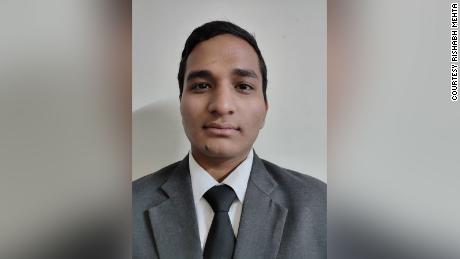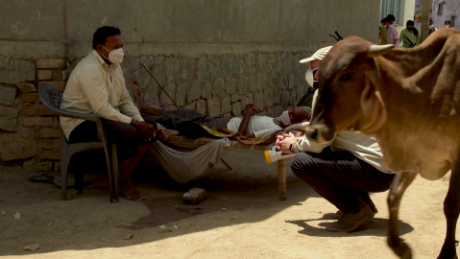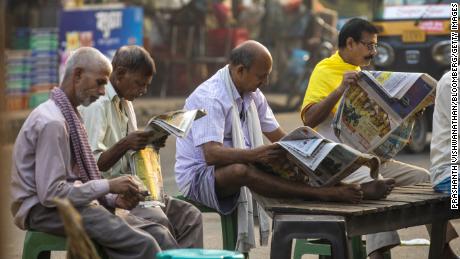Millions won’t ditch Modi yet despite India’s catastrophic new wave of Covid-19 cases
“The world will never see another leader like Modi,” said the 47-year-old professor of general surgery from Varanasi, which is both Modi’s parliamentary constituency and one of the holiest cities for Hindus. “He is not a man, he’s superman. He’s a saint.”
Like so many Modi supporters, Tiwary boasts that the Prime Minister, at 70, works more than 18 hours a day and has never taken a day off work in 23 years, echoing a claim that senior officials from Modi’s Bharatiya Janatiya Party (BJP) have made many times.
Modi, who has ruled India since 2014, has remained wildly popular despite setbacks in his efforts to kickstart the country’s staggering economy, to create millions of new jobs and to provide healthcare to India’s poorest citizens.
Just as the pandemic contributed to the defeat of Donald Trump in the US, Modi was “almost certain” to take a hit politically too, said Ashutosh Varshney, director of the Center for Contemporary South Asia at Brown University.
“A very large part of the base is hugely disenchanted because they’ve lost their loved ones. They’ve lost their siblings, their parents, their children,” he said.
Modi’s loyal base
Modi may be 70 years old, but he also has legions of young Indian supporters.
Rishabh Mehta, a 24-year-old university student, said he was drawn to Modi’s unwavering nationalism and thought well of the leader’s achievements on improving India’s defense systems.
When asked about the country’s high Covid-19 death toll, Mehta said he believed the numbers had been inflated by state leaders seeking to tarnish Modi’s image. Mehta believes there is a targeted “campaign going on to defame the … central government.”
But Mehta’s loyalty has remained strong, even after losing one of his close friends to the virus. Mehta himself took his friend to hospital in the capital, New Delhi, where he described chaotic scenes of “people shouting, people coughing, people crying” in desperation.
“It was a very horrific moment for all of us,” he said.
Another Millennial standing by Modi is Vagisha Soni, a 29-year-old research scholar in Delhi. Soni has been helping source oxygen and ICU beds amid critical shortages. Some of her friends lost their parents to the virus. And like Tiwary, the medical professor, she sees something greater in Modi.
“I always had this feeling that there has to be one leader who has to guide us, so that was Modi. There was no other figure,” she said.
As for his handling of the pandemic, Soni pointed out that the death rate per capita in India shows the country isn’t doing as badly as perceived from afar. She said the US was also “unable to handle [the pandemic], having the best of medical infrastructure, the best of facilities.” So, it was only natural that India would not be able to cope either and using Modi as a “punching bag” was unfair, she argued.
A ‘Modi devotee’ loses faith
“If you go to the village and say Modi’s name, people will get ready to kill you. They are angry. They don’t want to hear Modi’s name.”
He said private ambulances were charging extortionate prices to take villagers to hospitals that were around 90 kilometers (around 55 miles) away and demand for basic drugs such as paracetamol had sent prices through the roof..
“If you have money, you live. If you don’t, you die,” he said.
Ashutosh Varshney, from Brown University, said Modi’s political fate depends on a clear rival presenting themselves before the country’s next general election in 2024.
Although India’s huge population makes polling a challenge, there are some indications that the tide is turning against Modi outside the BJP stronghold states. In April’s West Bengal elections, the BJP gained more seats but failed to clinch victory in the battleground state, as it had hoped to do and worked toward for years.
As Modi’s government sensed this power slipping away, it sought to take back control of a critical narrative that questions the Prime Minister’s status as the savior of India. In Delhi, 25 people were arrested recently for putting up posters criticizing Modi for exporting vaccines to other countries, according to several local media outlets.
Modi’s future may also depend on how successfully he can deflect blame for the pandemic onto local leaders, as his party has sought to do in areas where they are not in power.
State powers, however, are limited by the funding they receive. OECD data shows India spends very little on healthcare, typically less than 4% of gross domestic product. The US spends around 17%, while the United Kingdom spends around 10%.
Even long-term BJP voters are starting to question whether Modi should remain in the job.
“My wife sent a message to me saying, ‘There is no more oxygen left in the hospital,'” he told CNN, breaking down as he spoke.
A self-described former “Modi devotee” from Lucknow, who also didn’t want to give his name, said he and his family had voted for Hindu nationalist parties including the BJP for generations. However, after losing his wife to Covid-19 earlier this year, he is unable to forgive the man he once revered.
“I tried my level best to get some cylinders but could not. Nobody was here to help me. I could not do anything … Every country in the world cares about its citizens. Not in India.”
“The blood is on their hands,” he said of the BJP. “That blood — they can never wash it.”
![]()








